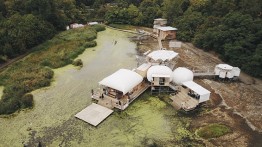Current Work | raumlaborberlin: Working on Common Ground
Wednesday, March 1, 2023, 12 - 2pm

raumlaborberlin | Floating University Berlin, Berlin, Germany, 2018. Image credit: Alexander Stumm
This event will be conducted through Zoom. You may register here.
The 2022–23 Current Work series examines projects and firms enacting new modes of architectural practice, collaboration, and community engagement.
Founded ten years after the fall of the Berlin Wall, raumlaborberlin is an experimental collective working at the intersection of architecture, urban planning, art, and education. Though the collective’s nine members share a background in architecture, they resist simple categorization: They are self-avowed artists, performers, researchers, inventors, curators, and teachers. Eager to expand the definition of architectural practice, the collective—whose name means “space laboratory”—maintains a critical stance towards dominant modes of production, focusing instead on provocative participatory activations of urban space.
Recent projects include:
- [Working on] Common Ground, a 100-day learning laboratory in a former brick factory in Kosovo’s capital city
- Floating University Berlin, an experiment in collective learning housed in a temporary structure floating in a Berlin rainwater basin
- Allmänna Badet / Bathing Culture, a public sauna built above the harbor of a deindustrializing Swedish port city.
raumlaborberlin won the Golden Lion at the 2021 Venice Architecture Biennale and the 2018 Global Award for Sustainable Architecture.
The lecture will be presented by Benjamin Foerster-Baldenius and Jan Liesegang.
Benjamin Foerster-Baldenius is an architect and member of raumlaborberlin. Foerster-Baldenius studied at the Technical University of Berlin, Berlin University of the Arts, and the Royal Danish Academy of Fine Arts. He is the founder and dean of Floating University Berlin.
Jan Liesegang is an architect and cofounder of raumlaborberlin. Liesegang studied at the Technical University of Berlin, the Royal Danish Academy of Fine Arts, and Cooper Union. He has taught at the Stuttgart State Academy of Art and Design and, in 2010, held a residency at German Academy Rome Villa Massimo.
This program will be moderated by Mark Wigley. Wigley is a professor of architecture and dean emeritus of Columbia University GSAPP. He received his BArch and PhD from the University of Auckland, New Zealand.
This program is supported, in part, by public funds from the New York City Department of Cultural Affairs in partnership with the City Council, and by the New York State Council on the Arts with the support of the Office of the Governor and the New York State Legislature.
The event is co-presented by the Architectural League of New York.
This event is free and open to the public through Zoom. Registration is required.




